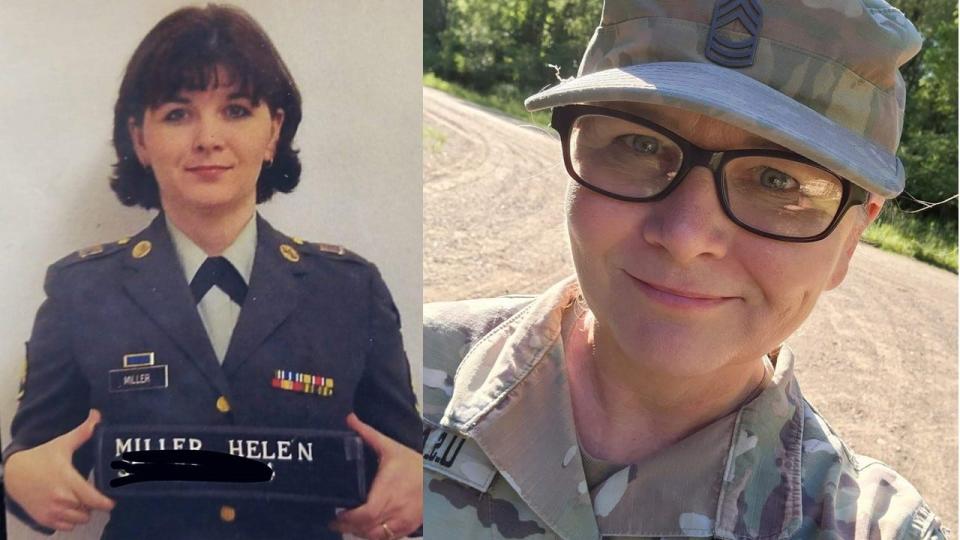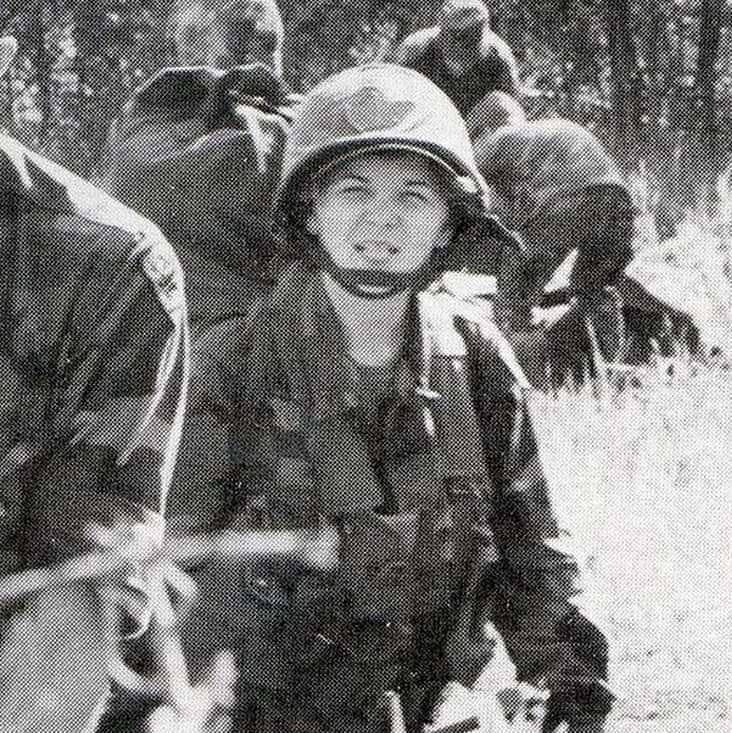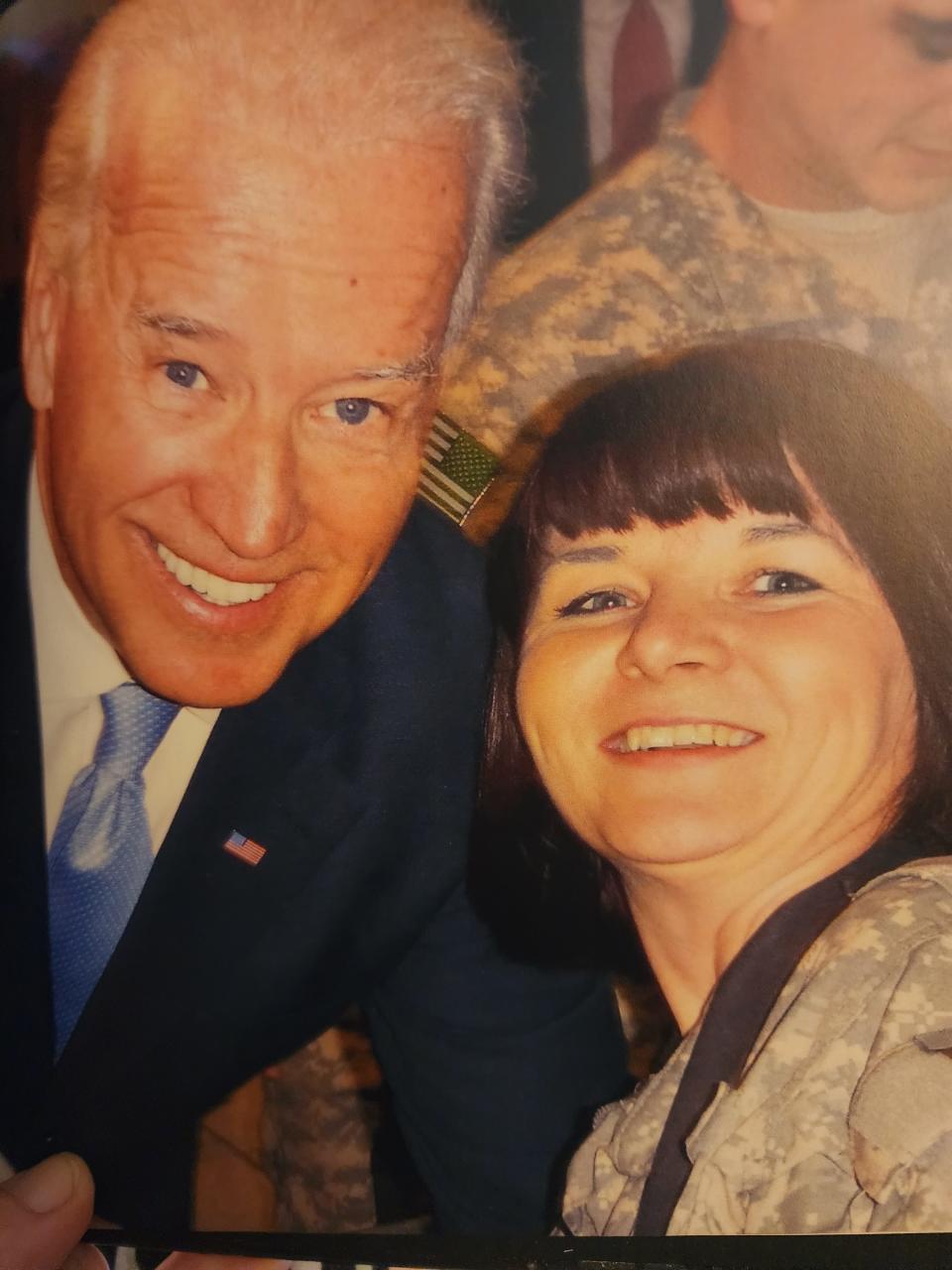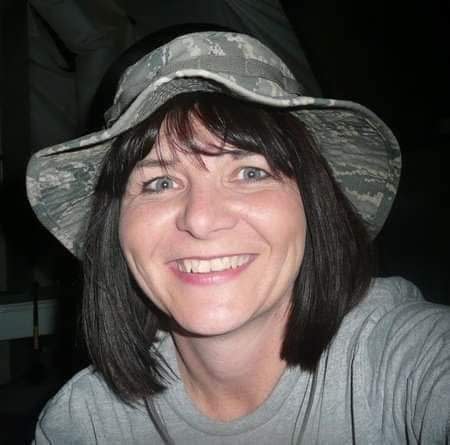Adrian woman marks 40 years in Michigan National Guard
LANSING — When Helen Miller enlisted in the Michigan National Guard at the age of 17, she was motivated by a sense of service.
Her father, Donald Sharp, and grandfather Bud Sharp each served in the Army, her father during the Vietnam War.
“I kind of just felt in my bones that I needed to do my part and do my time,” Miller said last week. “I was just going to do the little bit, like everybody, go in, serve a few years, say I did it, you know, move on, and I just never got out for whatever reason.”
Now, she is one of two women in the Michigan National Guard to have recently marked 40 years of service. Miller, a master sergeant working full-time in public affairs at Joint Force Headquarters (JFHQ) in Lansing, has served all 40 years in the Michigan National Guard. Chief Warrant Officer 4 Lora Lingeman of the Sustainment Automation Support Management Office Chief at the JFHQ was the first woman serving in the state to have 40 years of total service as of September 2023. Miller reached her anniversary in October.

Miller served the first 19 years with Adrian’s Bravo Company of the 156th Signal Battalion as a telecommunications center operator. The 156th provided radio, satellite and internet communications. When the Adrian Armory closed, she transferred to Lansing and became a photographer, or, in the military’s terminology, a multimedia illustrator. She is now a public affairs mass communications specialist.
“It’s always provided for me, always been a solid, steady job for me,” Miller said. “Provided for my family, provided for my kids, paid all my bills. I got skills and training in there. I travel all over the world. I did things I wouldn’t do if I weren’t being in the service. For some reason, it just always fit the bill for me, and I just kept doing it. I’ll keep doing it until they tell me it’s time to go or I just physically can’t do it anymore.”
She can serve until she is 60, as long as she can meet military fitness requirements.
“I’m not saying I will. I could,” she said.
Being in the military isn’t easy, particulary when orders take a soldier away from their family.
“I 100% have to thank my kids, my family … for their support because they have had to understand I’m not going to be at every Christmas, I’m not going to be at every family event. I’ve definitely missed birthdays, I’ve missed so many different things from training and travels that I’ve had to do,” she said. “…My children have had to put up with a lot of me being gone and missing things.”
She has been deployed once, and her husband, Perry Miller, deployed twice with the Guard. He and their kids, Cassandra and Donald, live in the Adrian area along with several other relatives. She moved to Lansing after six years of commuting from Adrian.
Serving in the Guard
Most people sign up for a few years, and, in the Guard, it’s usually part-time with monthly and annual training plus being called upon to help during natural disasters or other times of need. Miller said even full-timers like her usually stay in for 20 years, then retire and take a civilian job.
Miller does her monthly training with the 46th Military Police Company, but her full-time job is in public affairs.
She was still in high school when she enlisted in 1983. It was the Cold War, and no one worried about being deployed on active duty, though her father wasn’t happy about her decision because he had Vietnam on his mind. After 9/11, the chances of being deployed to fight or support combat operations went up dramatically.

Miller’s experience with the Guard started before she enlisted when she was part of a Boy Scouts group that did training at the Adrian Armory. She was able to meet soldiers of the 156th, and she would accompany them on their drill weekends before she enlisted and went to basic training.
Miller's deployment was to Afghanistan in 2010 with the military police to run a prison. She worked with families who would come to visit the prisoners.
She made friends with soldiers from around the U.S. and in the Afghan Army.

The United States’ withdrawal from Afghanistan and the return of the Taliban to power was “very frustrating,” Miller said.
“It’s hard to really talk about it,” she said. “…It makes you feel bad for those that you got to know, become somewhat friends with. I feel horrible for the families. I worked with families over there and worked with a lot of children. We did a lot of stuff with children’s hospitals and organizations over there. It’s tough to hear that kind of thing, because you’re always wondering what’s happening over there with those that you met and got to know.
“That’s very frustrating, but we can only do what we’re told to do and do our job and move on.”
Documenting the Guard
Her interest in photography led her to her current role.
“I always had a camera on me and was always documenting my unit, just because it was something I did,” Miller said. “I did that stuff in high school when I was on the yearbook and always for some reason had interest in that.”
When she moved on from the 156th, a sergeant major saw the photographer job posting and suggested she apply. She didn’t think she qualified because she didn’t have formal training or college education. He suggested she show them a portfolio of her work and maybe the Guard would train her.
“I went to the interview, and that’s exactly what happened,” she said. The colonel who looked at her work said, “Just imagine what we could do with you if you had the proper schooling and the proper equipment.”
“They hired me, and I’ve pretty much been here ever since,” she said.
Over the years, she won some awards for her photography. Now, she does more management of other soldiers who cover assignments, but she still takes photography assignments here and there. Her role now is more working with the media and writing stories.
Her favorite part of the job is documenting the soldiers and training of the Michigan National Guard.
“For me, when they have something to show their family members … that’s what makes me happy,” Miller said.
A woman in the military
Enlisting as a young woman when the Guard had more, smaller armories that were connected to their communities had its benefits, Miller said.

“It was so much nicer and easier, I think, because those units would take you under their wing as a little sister or member of the family and help you out with things,” she said. “That unit ended up being your second family.”
Still, “women had to work, really, really hard” to be taken seriously and respected when she was in her 20s, she said. But there were also people who looked out for woman, too.
“It was definitely a man’s world. There’s no doubt about it,” Miller said. “Even now it is, but obviously you can see so many breakthroughs with the first female tank driver, the first female engineer, the first brigade commander. That’s all happening now. I think it’s getting better and things are opening up and women are seeing what they can get out of the military and what they can give back.”
She would tell any woman in the military now that they should try whatever they want to try.
Miller said she’s seen a change in attitudes about military service over the years. She particularly noticed it after Desert Storm in 1991, when the U.S. and its allies forced Iraq out of Kuwait.
“That is when a lot of people started being able to support us,” she said. “When you’d go through an airport when you came home from a deployment and people would clap …. Vietnam people never got thanks for anything. I’m the first person to walk up to anyone who has any way of me knowing they’re a veteran, because they didn’t get that.”
Having Desert Storm and the Iraq and Afghanistan wars in recent memory has made people more aware of the sacrifices people in the military make she said. She says she sometimes gets embarrassed when she is out having dinner and someone buys her meal, but she understands that people are appreciative of her service.
“I’m like, ‘I didn’t do anything. I’m just serving, that’s it,’” Miller said.
— Contact reporter David Panian at dpanian@lenconnect.com or follow him on X, formerly Twitter: @lenaweepanian.
This article originally appeared on The Daily Telegram: Adrian woman marks 40 years in Michigan National Guard

